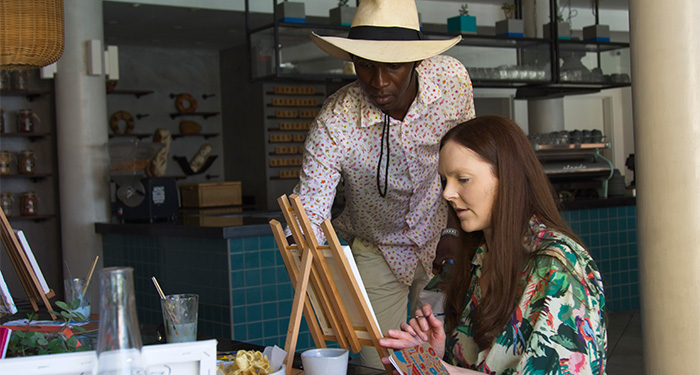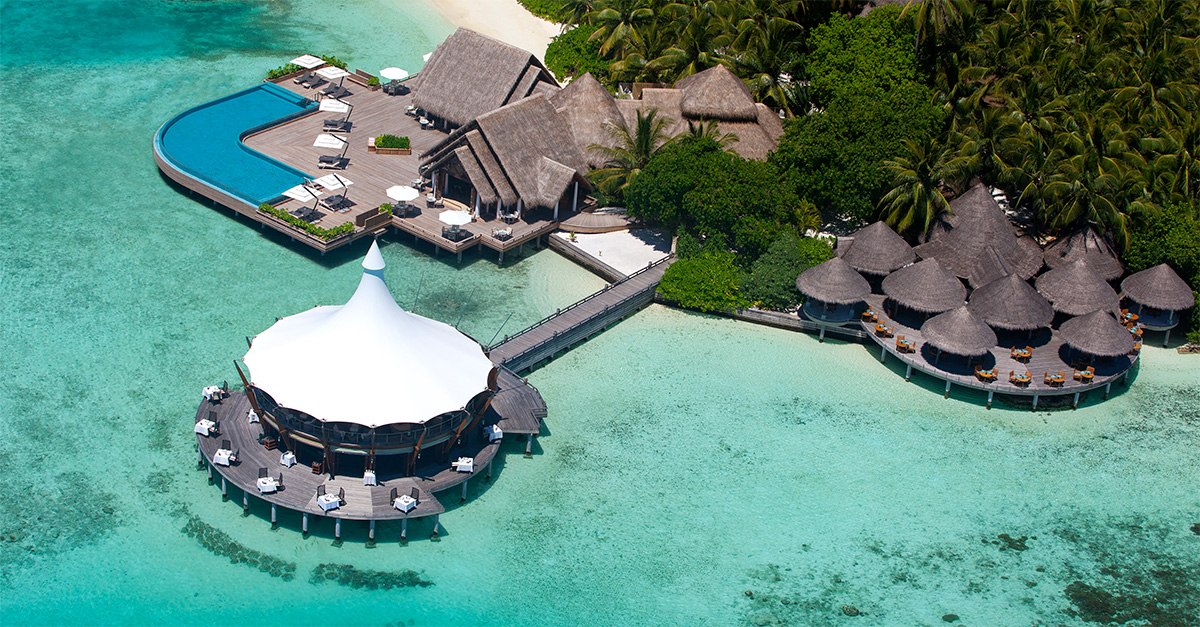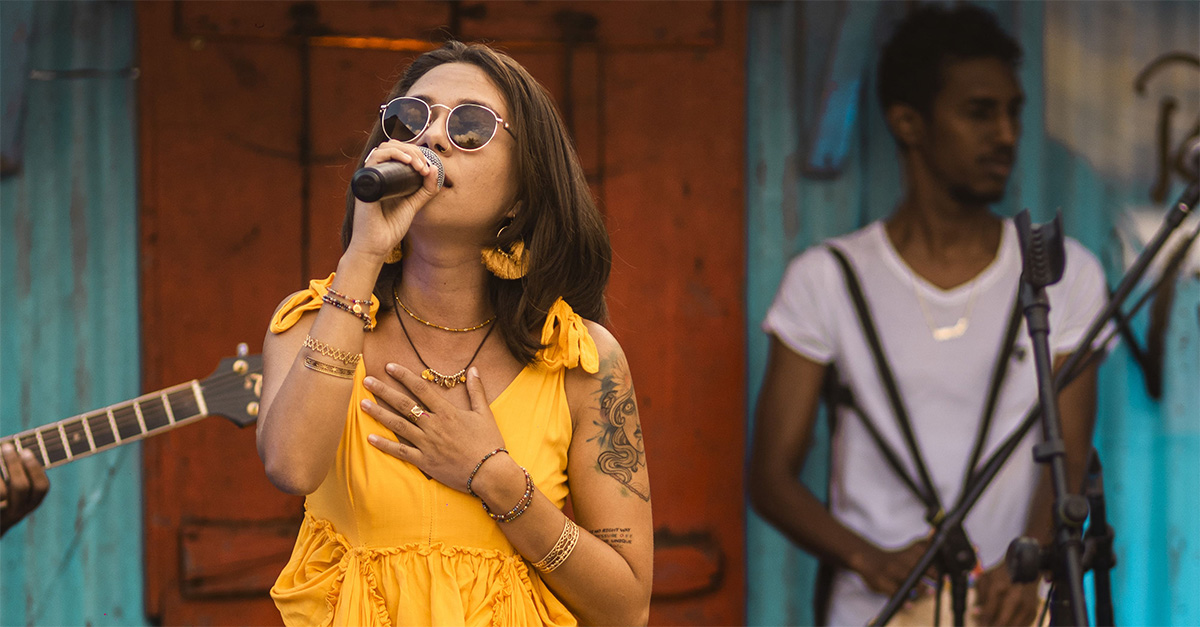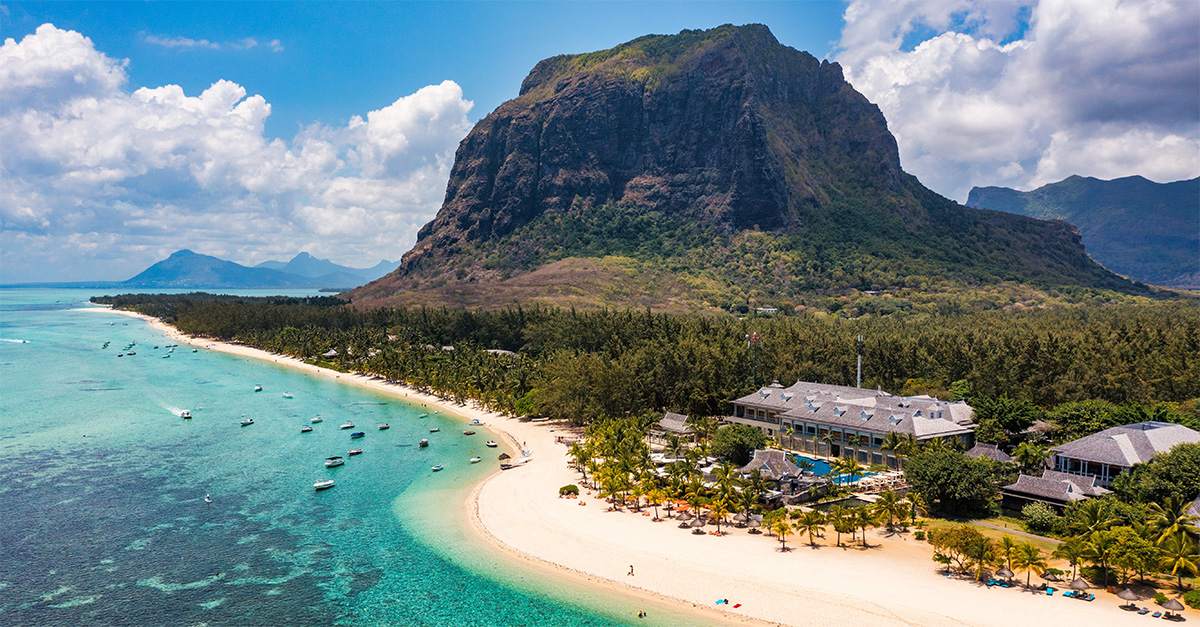Culture at the poolside: Inside the Mauritius eco-hotel where guests learn skills from locals

As well as eliminating single-use plastics and serving organic food, Salt of Palmar, part of the Lux Collective, prides itself on local experiences, says Clare Vooght
Click here to download and save as a PDF
I’m sitting near the pool at eco?hotel Salt of Palmar in Mauritius with a paintbrush in my hand – trying to replicate the cool Camille Walala?designed colour-block courtyard, with its coral and pastel walls.
Its black?and-white striped columns frame the view out to a pale turquoise sea, but the waves are proving tricky. Luckily, local painter Dani, who specialises in sea scenes punctuated by bobbing fishing boats, is on hand to help our small group capture the gentle movement of the waves.
He wanders around the large communal table, surveying our work, effortlessly helping to blend the paints. “You can use the white here, over the turquoise to blend for the sea,” he says, recreating the frothy swell of the water.
Its black?and-white striped columns frame the view out to a pale turquoise sea
Our painting lesson is part of Salt’s Skill Swap programme, where guests can bring a skill to teach others, or learn a new skill from a local. Sessions are constantly being updated, but on our visit they include pottery, bread making in the on-site bakery, barista coffee sessions and painting lessons.
Collectively, they bring to life the hotel’s ethos: to connect guests with local people and places. With tourism a key part of Mauritius’s post-pandemic recovery – around 14% of jobs are in the travel industry – Salt’s community-focused mission is even more fitting.
And getting to Mauritius is now much easier too, since the government lifted a test-on-arrival rule and the need to provide proof of vaccination earlier this month, in a bid to strengthen that recovery.

Putting people first
Salt of Palmar is a sustainable hotel in every respect. But what sets it apart from many other eco properties is its focus on the human side of sustainability: connecting guests with the local people and culture to ensure that everyone benefits.
Guests can spend the day exploring Mauritius with a local, or enjoy local culture in a more relaxed way: perhaps under chic black-and-white striped umbrellas by the pool, with a cocktail inspired by a certain part of the island. And while locally sourced produce is a given in many eco hotels, Salt adds a human touch by telling guests the names of the people behind what they’re eating.
You’ll find organic vanilla grown in St Julien, by Selva, in the Sh! Lights Out cocktail; the fruit at breakfast is grown by Bibi and Asok on a family plantation near Mahebourg; and Kishor heads out at dawn from just north of the resort to catch the fish the chef serves daily.
Guests can also see where things come from: they can tour Selva’s plantation to learn about organic methods and how they’re experimenting with aquaculture; or take a fishing trip with Kishor before cooking their catch at the hotel.

Fitness in the forest
I opt for a forest hike with Mauritian-born personal trainer Tony, who leads me on a march through Bras D’Eau National Park, pointing out the wildlife and the ruins of a sugar mill along the way.
We stop by a peaceful lake for a stretching and meditation session – soundtracked by birdsong – watching the fish beneath the surface, before a hearty picnic of sandwiches, home-made pastries and kombucha made by Salt’s in-house fermentation chef.
Another highlight is a ToursByLocals city tour with Samad, who takes me on a fascinating walk around laidback Port Louis, Mauritius’s multicultural capital. We take in St Louis Cathedral, the country’s oldest church, Jummah Mosque, the country’s oldest mosque, Chinatown, and Central Market, where we chow down on Indian roti.
“We have Muslims, Christians and Hindus living here with no problems – we all get along,” says Samad, something we hear people say a lot in Mauritius. “And if we see someone having a problem in the street, we’ll always help.”

A taste of Mauritius
We recognise this thoughtfulness again when we meet chef Nitish, back at Salt. He greets each and every guest at check-in to make sure food suggestions are tailored to them, and to ensure the kitchen knows of any allergies or intolerances.
Making an authentic Mauritian curry with him (another option on the Skill Swap programme) is a real delight, as he takes us through each step in detail, from knife safety when chopping onions and tomatoes, to creating the paste by crushing the garlic and spices with a pestle on a flat, Indian-style mortar.
We add chicken to our marinade (Nitish teaches vegan classes too). And after kneading and frying the dough for a farata, a soft, flaky Mauritian flatbread, we put it all together to make a gentle giant of a curry wrap – mild but mighty in flavour – which we devour in the kitchen.
We put it all together to make a gentle giant of a curry wrap – mild but mighty in flavour
“In Mauritius we have nice botanical gardens, nice hotels, nice lakes and mountains. But it’s really about the culture itself,” says Nitish. “I can say, ‘Try this cocktail: all the ingredients are from the high plateau, and it’s been created in-house by this person, in our team.’ And now you’ve tried this curry.
This is how we get people interested in our culture – we try to make our experiences special.” And they are. For starters, it’s the most upskilling I’ve ever done within the four walls of a hotel – from learning a watercolour painting technique to honing a new recipe.
Plus, as well as meeting many, many lovely people who I’ll remember for a long time, I can say I’ve learnt a lot about the destination, and will bring home a far stronger sense of this country’s culture than I’ve ever managed to soak up by a hotel pool before.
Tried and tested
Salt of Palmar
Salt of Palmar is possibly the hippest hotel imaginable. The 59-room adult-only sustainable Lux Collective property is finished with a coral, yellow, lilac, cobalt colour block and black-and-white striped design throughout.
The ethos is about experiences and encouraging human connection, and guests are invited to meditate when they check in and out. So far, so millennial. But beyond the stylish design, there’s much substance.
All the food is locally sourced and organic; energy-hungry minibars are available only on request; kitchen waste is composted and used to grow more; there’s no wasteful buffet option and no single-use plastics; and toiletries are packaged in biodegradable paper.
But this does not come at the expense of comfort. Salt is still a five-star property, but not of the lavish kind. The luxury here is the focus on the experiences, with service that is friendly, not stuffy: instead of butlers, guests can ask their personal concierge, or ‘Salt friend’, to organise a candlelit dinner on the beach.
If this is the future of luxury in a world where we’re more conscious of what we’re consuming, then bring on the sustainable hotel revolution.

Local flavours; street food
- Boulette
Little round, steam-cooked dumplings made with either chicken or fish, served in a soup with green onions.
- Roti chaud
Indian flatbread stuffed with butterbean curry, pickles and rougaille sauce, which is made with tomatoes.
- Magic bowl
Also known as bol renversé (upside-down bowl), this dish layers egg, rice and oyster sauce-slathered stir-fried seafood, meat or veg.
- Victoria pineapple
A sweeter variety of pineapple, often served on the beach, sprinkled with sea salt and chilli.
- Dholl puri
A street-food staple, this flatbread is filled with curried split peas and bean curry.

Book it
Scott Dunn offers seven nights at Salt of Palmar from £1,900. This rate is based on two people sharing on a bed-and-breakfast basis, including private road transfers and international return economy flights.
scottdunn.com
ToursByLocals offers Samad’s Mauritius Full Day City Tour – Port Louis for $200 (tours are for up to three people). Tours are available worldwide, and agents earn 5% commission. Once they’ve booked $7,500 worth of tours, commission increases to 10%, retroactive to the start of the calendar year and going forward for the rest of the year.
toursbylocals.com/agency_join

PICTURES: SAR Production; Salt of Palmar; Matt Radbourne; Shutterstock/Ralu Cohn
Read more
x.travelweekly.co.uk/destinations/wellness-in-mauritius-a-look-inside-the-newly-opened-lux-grand-baie">Wellness in Mauritius: A look inside the newly opened Lux Grand Baie
x.travelweekly.co.uk/destinations/lesser-known-islands-for-an-indian-ocean-holiday">Lesser-known islands for an Indian Ocean holiday
x.travelweekly.co.uk/destinations/eco-living-at-lagoon-attitude-mauritius">Eco-living at Lagoon Attitude, Mauritius
You have viewed both of your 2 free articles this month as an unregistered user
To continue reading, please register with Travel Weekly free of charge, or if you have already registered click here to login



